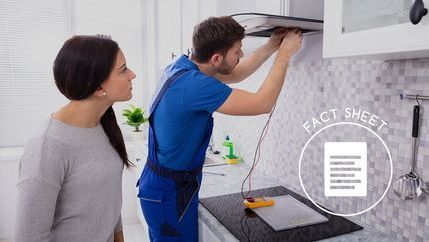
Letting agents and landlords must ensure electrical installations are inspected and tested at least every five years by a qualified and competent person. A written EICR must be obtained with a copy given to existing tenants within 28 days.
If remedial or further investigative work is required, it must be carried out within 28 days, or sooner if specified in the report. Once completed, tenants and the local authority must receive written confirmation.
Propertymark resources to aid compliance
Letting agents play a vital role in tracking dates, keeping landlords informed and ensuring inspections and follow-up work are arranged and documented. Our frequently asked questions provide clarity for landlords and tenants on what the regulations require, what is involved in an inspection, and how to respond to issues identified.
Our Electrical Safety Standards in England fact sheet for Propertymark members outlines the tenancies covered, requirements for remedial work, and how to respond to requests from the local authority. It includes timing rules for inspections, and how different tenancy types are treated under the regulations.
Fact sheet: Electrical safety standards
The Housing and Planning Act 2016 allowed Ministers to introduce electrical safety standards for tenancies in the private rented sector.
Understanding a report could be challenging, and there are four standard codes typically used in EICR reports. C1 (danger present), C2 (potentially dangerous), C3 (improvement recommended) and FI (further investigation required). For non-standard situations or details on how to advise landlords, our Member Helpline is available to support members with tailored guidance. A simple guide is available too.
Electrical safety certificates and reports explained
The Propertymark Lettings Helpline receives frequent questions about requirements for electrical safety checks. Electrical Installation Certificates (EIC) and Electrical Installation Condition Reports (EICR) are documents that confirm a safety check has been completed in a privately rented property, but are used in different situations.
Don't get your wires crossed – know your nation's rules
In Scotland, landlords are legally required to conduct a comprehensive electrical safety inspection at least every five years. This includes both an EICR covering the fixed wiring, and a Portable Appliance Test (PAT) for any electrical items supplied with the tenancy. Landlords must provide tenants with a copy of both reports.
Our Scotland fact sheet explains how this duty works in practice, including qualification standards for those carrying out inspections.
Northern Ireland electrical safety regulations were introduced in April 2024 for all new tenancies. A satisfactory EICR dated within the last five years. Any urgent issues flagged in the report must be resolved before the tenancy starts.
Landlords must also ensure that electrical installations remain in good repair throughout the tenancy. Similar to England, copies of the EICR must be shared with tenants and local councils if requested. Propertymark Members can find out more using our fact sheet.
In Wales, landlords must ensure electrical installations are safe under the Fitness for Human Habitation requirements introduced by the Renting Homes (Wales) Act 2016. This includes testing the installation at least every five years and providing tenants with an EICR within 14 days.






